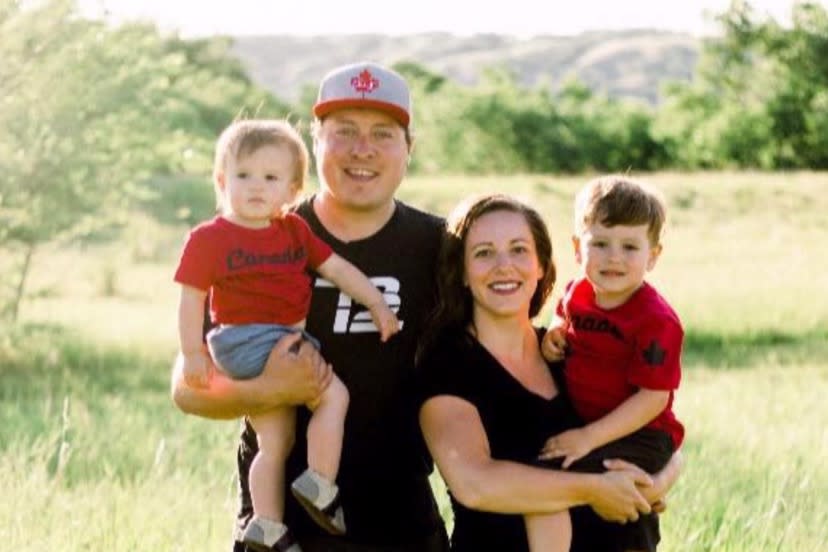Saskatchewan curler dies from rare childbirth condition: What is amniotic fluid embolism?

Canadians are grieving the loss of Saskatchewan curler Aly Jenkins, who died on Oct. 20 due to complications arising from the labour and birth of her third child. It was the day of her 31st birthday.
Her husband, Scott Jenkins, told AM650 CKOM that she was excited to give birth to the couple’s second daughter, Sydney—the couple also have a four-year-old boy and 18-month-old girl—and that everything was normal when they arrived at the hospital.
During labour, however, Aly began to feel cold. Her condition deteriorated from there. Jenkins said that although doctors did everything they could to save her and she fought to stay alive, after five hours her heart gave out.
“She was the rock, she loved everybody,” Jenkins said, adding that it’s unbearable to think of their kids not having memories of their mom. “It just drives me crazy. They’re just so young, they won’t remember her.”
Baby Sydney remains in critical care in the neonatal intensive care unit but is improving, according to Jenkins’s Facebook page. A Go Fund Me campaign has been set up to help Jenkins and his family move forward.
Doctors determined that amniotic fluid had entered Aly’s blood stream, causing what’s known as amniotic fluid embolism (AFE).
ALSO SEE: Canadian curler Aly Jenkins remembered as a ‘fierce competitor’
The condition is rare, occurring in approximately up to two of 100,000 pregnancies, according to a 2016 study published in the Journal of Obstetrics and Gynecology.
Clinical signs include a rapid deterioration of maternal condition, cardiac arrest or arrhythmia, hypotension (abnormally low blood pressure), respiratory distress, coagulopathy (which is marked by bleeding with signs of shock and cold extremities) and massive hemorrhage.
Some women have “premonitory” symptoms such as tingling, shortness of breath, agitation, and a sense of “impending doom” which might precede signs of cardiovascular collapse.
“The cardiovascular system collapses,” says Dr. Sarka Lisonkova, assistant professor and Michael Smith Scholar in Health Research in the department of obstetrics and gynaecology at the University of British Columbia’s Children’s and Women’s Health Centre in Vancouver. “There’s a sudden collapse that needs really effective cardio pulmonary resuscitation. That’s the first thing. If coagulopathy follows, there needs to be response to that—either platelets or blood transfusion.”
The cause of AFE isn’t well understood, Lisonkova says. It seems that when amniotic fluid enters the maternal bloodstream, there can be an abnormal reaction that prevents the exchange of oxygen and carbon dioxide in the lungs. The condition more closely resembles anaphylaxis or a systemic inflammatory response than a classic embolism, or blood clot, which is marked by shortness of breath and chest pain. It can also mimic myocardial infarction (heart attack), while other diagnoses, like septic shock, must be ruled out.
ALSO SEE: British teenager paralyzed after falling from his couch
Prenatal risk factors included advanced maternal age, multiple pregnancies, gestational diabetes, and placenta previa. There are also risk factors associated with obstetric interventions, such as induction of labor, operative vaginal delivery, and caesarean delivery.
The condition is difficult to research because of its rarity, Lisonkova says. And yet while it’s uncommon, AFE is one the leading causes of direct maternal death in industrialized countries - with respect to direct maternal deaths
Some women who survive AFE have permanent neurological injury.
“It’s unpredictable,” Lisonkova says. “But it’s extremely rare. Women should not be worried about that with their pregnancies. Most of my colleagues would never see it in their career.
“The way to address it is with multispacer team that’s ready to respond to emergency in tertiary centres,” she adds. “That’s the way we have to increase the chances of survival.”
Let us know what you think by commenting below and tweeting @YahooStyleCA! Follow us on Twitter and Instagram.



